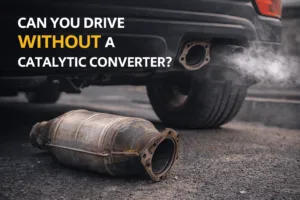Few things are as unsettling for a driver as suddenly losing acceleration while on the road. You press the gas pedal, and instead of the car responding with its usual power, it falters, slows down, and then unexpectedly regains its momentum. This issue can not only disrupt your journey but also raise concerns about your vehicle’s reliability and safety.
Understanding why this happens is crucial. While it may seem like a random glitch, it often points to underlying mechanical or electronic problems. These issues can range from minor inconveniences, like a dirty air filter, to more serious complications involving the fuel system or transmission.
This guide explores the possible causes of a car losing acceleration and then regaining it, how to identify the symptoms, and what steps you can take to resolve the problem. By the end of this blog, you’ll have a better grasp of how to address and prevent this issue effectively.
Common Causes of Acceleration Loss and Recovery
When a car loses acceleration temporarily and then regains it, the root cause typically falls into one of the following categories:
1. Fuel System Issues
The fuel system is responsible for delivering the right amount of fuel to the engine for combustion. Any disruption in this process can cause acceleration problems.
- Clogged Fuel Filter: Over time, the fuel filter collects debris and sediment. If it becomes clogged, fuel flow is restricted, leading to hesitation in acceleration.
- Failing Fuel Pump: A weak or failing fuel pump may struggle to deliver adequate fuel pressure to the engine, especially during acceleration.
- Dirty Fuel Injectors: If the fuel injectors are clogged, they can’t spray fuel evenly, causing engine misfires and a temporary loss of power.
2. Air Intake Problems
The air intake system provides the oxygen necessary for combustion. Any restriction here can disrupt the engine’s performance.
- Dirty Air Filter: A clogged air filter restricts airflow, which can cause the engine to hesitate when you accelerate.
- Mass Air Flow (MAF) Sensor Issues: The MAF sensor measures the amount of air entering the engine. A malfunctioning sensor can send incorrect data to the engine’s computer, resulting in poor performance.
3. Ignition System Malfunctions
The ignition system ensures that the air-fuel mixture in the engine is ignited at the right time. Problems here can lead to misfires and hesitation.
- Worn Spark Plugs: Old or damaged spark plugs may not ignite the fuel-air mixture efficiently, causing a temporary loss of power.
- Faulty Ignition Coils: If an ignition coil is failing, it can disrupt the spark needed for combustion, leading to acceleration issues.
4. Transmission Problems
A malfunctioning transmission can cause the car to hesitate or lose power temporarily.
- Slipping Transmission: If the transmission slips, it may fail to deliver engine power to the wheels effectively.
- Low Transmission Fluid: Insufficient fluid can cause delays in gear shifts, leading to hesitation during acceleration.
5. Electronic Control Unit (ECU) Faults
Modern cars rely on an ECU to manage engine performance. If the ECU receives faulty signals or has a glitch, it can result in erratic acceleration.
- Software Issues: A corrupted ECU software can cause intermittent loss of power.
- Sensor Failures: Faulty sensors, such as the throttle position sensor, can send incorrect information to the ECU, causing acceleration problems.
6. Exhaust System Restrictions
The exhaust system removes waste gases from the engine. If this system is blocked or malfunctioning, it can affect engine performance.
- Clogged Catalytic Converter: A clogged catalytic converter can restrict exhaust flow, causing the engine to lose power temporarily.
How to Diagnose the Problem
Identifying the root cause of acceleration loss requires a systematic approach:
- Observe the Symptoms
- Does the issue occur at specific speeds or under certain conditions?
- Is the engine light on?
- Inspect Visible Components
- Check the air filter for dirt and debris.
- Look for signs of wear on spark plugs and ignition coils.
- Use a Diagnostic Tool
- A professional-grade OBD-II scanner can retrieve error codes from the ECU, providing valuable insights into the problem.
- Listen for Unusual Noises
- A whining noise may indicate a failing fuel pump.
- Metallic rattling could point to a clogged catalytic converter.
Steps to Fix the Issue
Once the cause is identified, you can take the following actions:
Fuel System Repairs
- Replace a clogged fuel filter to restore proper fuel flow.
- Clean dirty fuel injectors using a specialized fuel system cleaner.
- Replace the fuel pump if it is weak or failing.
Air Intake Maintenance
- Replace a dirty air filter to improve airflow.
- Clean or replace a malfunctioning MAF sensor.
Ignition System Updates
- Replace worn spark plugs to ensure efficient combustion.
- Replace faulty ignition coils to restore proper spark generation.
Transmission Repairs
- Check and top up transmission fluid if it is low.
- Repair or replace a slipping transmission.
Exhaust System Fixes
- Replace a clogged catalytic converter to improve exhaust flow.
ECU Troubleshooting
- Update or reprogram the ECU software if necessary.
- Replace faulty sensors, such as the throttle position sensor or oxygen sensors.
Preventive Maintenance Tips
Preventing acceleration problems requires regular maintenance:
- Schedule Routine Inspections: Regular check-ups can identify potential issues before they escalate.
- Replace Filters on Time: Change air and fuel filters as recommended by your vehicle’s manufacturer.
- Use Quality Fuel: Low-quality fuel can lead to clogged injectors and other fuel system problems.
- Keep Fluids Topped Up: Regularly check engine oil, transmission fluid, and coolant levels.
- Monitor Warning Lights: Address engine warning lights promptly to avoid bigger problems.
When to Seek Professional Help
While some issues can be resolved at home, others require the expertise of a mechanic. If you encounter any of the following, consult a professional:
- Persistent loss of acceleration despite basic fixes.
- Unusual sounds or smells coming from the engine.
- A recurring check engine light with multiple error codes.
Conclusion
A car that loses acceleration and then regains it is a warning sign that should not be ignored. While the cause could be as simple as a dirty air filter, it might also indicate more complex issues within the fuel, ignition, or transmission systems.
By understanding the possible causes and taking timely action, you can ensure your vehicle operates smoothly and reliably.
Regular maintenance, combined with prompt attention to warning signs, will go a long way in preventing acceleration problems and ensuring a safer, more efficient ride.





